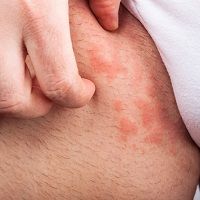Article
Odds of Parkinson's Disease Higher for Rosacea Patients
Author(s):
Chronic inflammatory skin condition, rosacea, may be linked to Parkinson’s disease through shared pathogenic mechanisms.

Chronic inflammatory skin condition, rosacea, may be linked to Parkinson’s disease through shared pathogenic mechanisms.
While the specific cause of rosacea is unclear, prior research has shown the activity of an enzyme called matrix metalloproteinase plays an integral role.
According to previous studies and reports from the CDC, increased matrix metalloproteinase activity has long been linked to Parkinson’s and other neurodegenerative disorders.
To study the link between new-onset Parkinson’s and rosacea, Alexander Egeberg, PhD, University of Copenhagen, Denmark, analyzed data for approximately 54,72,745 individuals from January 1997 to December 2011.
A total of 22,387 individuals were diagnosed with Parkinson’s and 68,053 with rosacea. The rates for Parkinson’s were 3.54 per 10,000 person-years, compared with 7.62 per 10,000 person-years in rosacea patients.
According to the study, patients with rosacea reported Parkinson’s diagnoses nearly 2.4 years earlier.
Interestingly, the results showed patients who were administered tetracyclines — a favorable rosacea treatment – had a slightly lower risk of Parkinson’s disease.
The authors concluded, “Rosacea constitutes an independent risk factor for Parkinson’s disease. This association could be due to shared pathogenic mechanisms involving matrix metalloproteinase activity.”
Despite the potential link between rosacea and Parkinson’s disease, Thomas S. Wingo, MD, Emory University, Atlanta, GA, stated in a related editorial that further research is necessary, especially regarding the potential impact of tetracycline on this risk.




